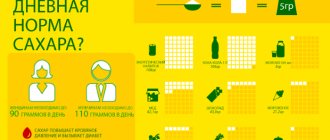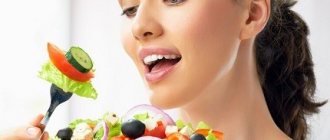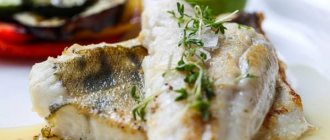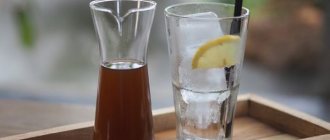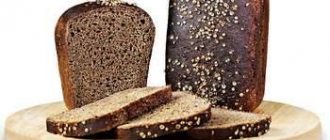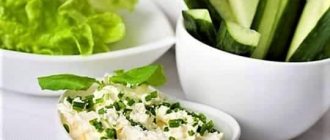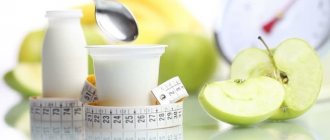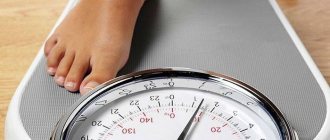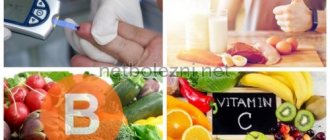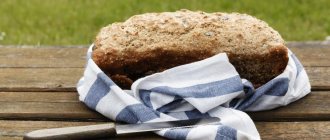Is it possible to lose weight quickly if you exclude sweets and starchy foods from the menu?
The question is whether it is possible to lose weight if you do not eat bread and sweets , asked by many girls who want to acquire beautiful body shapes. Often, even after receiving a positive answer, many cannot cope with their addictions and cannot withstand restrictions.
The problem of weaning off familiar foods is largely psychological. Therefore, there is no need to immediately resort to radical measures. The main key to success is gradualism.
The body should not experience serious stress when switching to a different nutritional system, otherwise a breakdown is inevitable. Strict restrictions further provoke overeating, disruption of metabolic processes and can lead to even greater weight gain.
Diet without flour and sweets: 6 rules
When switching to a low-carbohydrate diet, you need to completely give up sweets, confectionery and baked goods made from white flour.
In addition, it is imperative to adhere to six basic principles:
- Make it through the first week without any problems. This is the most difficult stage of the program. It is important to make every effort and not break your diet at the very beginning of your journey. After seven days, the need for sugar decreases significantly, and the body adjusts to other circumstances.
- Eat evenly. Eat 4-6 times a day, serving size should not exceed 250-300 g.
- Maintain drinking regime. The main source of liquid is ordinary water (mineral without gas, bottled, boiled). You are allowed to drink black, green, red tea, chicory, coffee, herbal drinks, and dried fruit compotes.
- Provide adequate sleep and rest. Severe stress, nervous tension or constant lack of sleep can lead to excessive cortisol production. Excessive levels of this hormone in the body lead to blocking fat burning processes.
- Don't neglect physical activity. It takes 25-30 minutes every day to devote to sports activities. Effective types of exercise include: walking, running, cycling, swimming, playing tennis, jumping rope, squats.
- Constantly monitor the general condition of the body during the period of weight loss. If you feel unwell, dizzy, nausea, abdominal pain and other negative reactions, you should immediately stop the diet.
Be sure to read: Do you need a cheat meal when losing weight, eating right, drying your body, what can you eat?
Acne - where are we wrong?
The lack of information about acne leads to a large number of myths.
11 myths and misconceptions about acne:
Myth 1: Fatty foods and chocolate cause acne.
Overeating sweet, smoked, starchy and spicy foods can complicate the course of any skin disease, but food is not the cause of acne.
Myth 2. Acne occurs only at a young age.
Acne is believed to be a disease of teenagers. This is wrong. 30% of women aged 25-30 years suffer from this disease, and the process occurs in a more severe form. Late acne often occurs in men as well.
Myth 3. Acne does not need to be treated; it will go away on its own.
The sooner you start treatment, the better. Advanced forms of acne take longer to treat.
Myth 4. You need to cleanse your skin with alcohol-containing products.
Such cleansing procedures can lead to dehydration of the skin, flaking and redness will appear, and the skin itself will become more sensitive.
Myth 5. Cosmetic cleansing will save you from acne.
This is wrong. Cleaning can reduce the number of comedones, but not blackheads. And if there are pustules, cleaning is contraindicated.
Myth 6. Acne disappears with the onset of pregnancy.
Alas, this is not true. There is no connection between pregnancy and the disappearance of acne.
Myth 7. Acne occurs due to external pollution of the skin.
Of course, if you don't take care of your skin properly, it won't lead to a healthy appearance. But you shouldn’t think that “blackheads” are dust and dirt that clog pores. Don't overdo it with washing, twice a day is enough.
Myth 8. If you have acne, you should not wash your face with water.
This is wrong. It’s just that people with hypersensitive skin may feel discomfort after washing with water, even to the point of developing an allergic reaction. In this case, it is better to use lotions that do not need to be washed off with water.
Myth 9. Acne appears from using cosmetics too often.
The quality of modern cosmetics is now very different from what it was before. And the skin “breathes”.
Myth 10. If you have acne, you cannot use decorative cosmetics.
Many cosmetic laboratories produce products for people with problem skin that not only mask the problem, but also treat it.
Myth 11. The sun is the best medicine.
This improvement is a temporary effect. In the fall there will only be an intensification of the process. Ultraviolet light increases sebum formation and further complicates the outflow of sebum, and high doses of ultraviolet light weaken local immune defense.
You can make an appointment with a dermatocosmetologist at the center for the treatment of acne and skin diseases by calling +7 (8452) 911-112.
Is it possible to lose weight if you only give up bread?
Not everyone can lose the pleasure of eating a crispy roll, a sandwich with cheese or fish. Overcoming your addiction to flour will not happen quickly.
To lose weight, it is not at all necessary to completely exclude bread products from your diet. The most high-calorie products are products made from wheat flour. Avoiding white bread, baguettes, buns, loaves and other rich pastries can help reduce your overall daily caloric intake.
People who are losing weight and cannot imagine life without flour should choose healthier options for bread products:
- yeast-free;
- made from whole grain, oat, flax, rye flour with the addition of bran;
- lean bread;
- thin pita bread.
Is it possible to lose weight if you don't eat sweets?
Excessive consumption of sugar will certainly lead to excess weight gain, dental problems, and deterioration of skin condition. It has been scientifically proven that excessive consumption of this substance leads to faster aging of cells and provokes worsening thrush and rashes on the body.
Completely giving up sweets is not entirely reasonable, and even pointless. In moderation, sugar can benefit the body. What a moderate amount is, we need to explain separately here, the fact is that one marshmallow contains the daily requirement of sugar, it follows that if you ate one marshmallow today, this is a moderate amount for this type of delicacy. It is necessary to take into account that it is contained in many products in hidden form: yogurt, mayonnaise, black bread, curds (not to be confused with natural cottage cheese, these products have nothing in common with it), processed or glazed cheeses, ketchup. These products must be removed from the diet.
Moderately acceptable treats include:
- natural honey (buckwheat, linden, flower, rapeseed);
- dried fruits (prunes, dried apricots, figs, apricots);
- marmalade;
- marshmallows;
- dark chocolate (with cocoa content from 80%).
To drink tea with sweets, you don’t have to buy them in the store. A healthy and low-calorie cottage cheese dessert that you can prepare yourself. To do this, you just need to acquire a couple of dietary recipes for making homemade oatmeal cookies, cheesecakes or almond sweets.
1. Sharp restriction in sugar
According to the expert, refusal from the “once and for all” series, when a person one day simply stops eating sweets, is a good method. But in real life, this method is effective only in 10% of cases. It is much more effective to use a gradual refusal strategy, which involves reducing the usual portions of sweets, the nutritionist believes.
In addition, do not forget about the importance of psychological attitude. Telling yourself “no, you can’t” is counterproductive. On the contrary, it is important to understand that you can do anything. But you need to choose the best from this: in this case, these are fruit and berry products.
Feelings of guilt should also be avoided, says Kopytko. When it appears, a person automatically strives to “eat it up” and plunges into “everything bad.”
How much sweet and starchy foods can you eat while losing weight?
In order to lose extra pounds, it is not at all necessary to completely give up baked goods and sweets. An important rule to follow is moderation.
It is better to consume fast carbohydrates in the first half of the day. Per day, without harming the figure, up to 20 g of sugar or 3-4 teaspoons is allowed. Too fatty and high-calorie desserts, it is better to replace them with dark chocolate and marshmallows. For example, during the second breakfast, you can allow 2 cubes of chocolate or a small strip of marshmallow without sprinkles.
Of course, if we are talking about sweets, then when losing weight, they play an important role. Exceeding the norm will definitely affect the final result. At best, the weight will come off very slowly, at worst it will just stand still.
During the day, it is recommended to consume about 100 g of bread. A few thin pieces can be eaten with soup during lunch or a healthy sandwich for an afternoon snack with kefir or yogurt.
How to stop eating sweets and starchy foods forever
Getting rid of sugar and flour addiction can be very difficult. Especially if the traditionally familiar lunch ends with tea with sweets, cookies or a piece of pie.
The following tips will help you overcome cravings for sweets and baked goods:
- You need to have a real motive. Having a clearly formulated goal allows you to achieve the desired forms.
- Constantly study literature about proper nutrition, the processes occurring in the body when consuming this or that food.
- Analyze all the pros and cons of the “harmful treat”.
- Include more protein ingredients, vegetables, herbs, avocados, ginger, nuts, and seeds in your diet.
- Find a suitable substitute for sweets. High-calorie desserts should be replaced with honey, fruits, dried fruits, marmalade, marshmallows.
- Make it a habit to exercise daily. It is enough to spend 15-20 minutes a day. Regular physical activity develops endurance, willpower, allows you to expend energy received from food, strengthen muscles and tighten the skin.
November 11, 2015
26161 views
Dmitry Pokrevsky Entrepreneur. Getting ready for retirement. I decided to save money not for medicine, but for health. In three years he changed himself beyond recognition. Six pack abs and several marathons are just a small part of the health that Dmitry has accumulated.
- man50.ru
- facebook.com/profile.php?id=100000987706785
- instagram.com/dm_p
- youtube.com/user/kpdpok
No matter what exercises we do, if we don't eat right, the exercises won't be very effective. I would venture to invite our audience to work on their taste habits. You'll have to use your willpower for a couple of days. The first two days will be the most difficult.
I love bread as much as you do, and probably more. Or rather, he loved it. We all grew up with bread, this habit is in our blood. Not to mention pasta, noodles and horns. I loved eating them with Bulgarian lecho. Until I was 40, I didn’t even understand how one could get sick, and it seemed to me that I would live without illness until I died.
“When you’re young, you can easily cope with stress and don’t feel lethargic. But when you get older and your lifestyle doesn’t change, problems make themselves felt. It is necessary to change the diet. Change is not that difficult, and the benefits of it are amazing.”
This is an excerpt from the book “The Taste of Victory” by famous tennis player Novak Djokovic. I can say absolutely the same about myself. I read his book when I had already significantly changed my diet. I read and saw that Novak experienced the same thing as me. And it was all the more interesting to read about the real experience of a person from the world of big-time sports.
Novak's sports career was heading into the abyss, and he himself suffered from health problems. Within a year, he managed to regain his form, became the “first racket” of the world and completely gave up some dishes. Djokovic wrote a book about this and this is not the advice of another pot-bellied nutritionist. The author writes about what helped him.
Novak had problems. He trained a lot and varied, but still remained slow, got tired quickly and could not lose a few kilograms. He thought he could get rid of his problems through exercise.
But at the same time, he ate like all Serbs - solid pizza, pasta and especially bread, plus hearty meat dishes at least twice a day. Together with the doctor, they conducted a blood test and it showed that he had a severe intolerance to wheat and dairy products. The following is a long quote from the book:
“If you want your body to react in a way that you like, stop eating bread,” said Chetoevich (his doctor). Novak was afraid to give up bread. Then Chetoevich explained that there is no need to bind oneself with a promise to give up bread forever. As the saying goes, forever is too long.
“For two weeks,” he said. “You don’t eat anything bready for two weeks, and then you call me.” It was difficult for me at first. I really wanted soft, dense and reliable bread. I missed the crispy crust of pizza, the sweet buns, and everything that, to my amazement, turned out to contain wheat. In the first week I simply disappeared without all this, but I forced myself to be disciplined.
Fortunately, although my friends and family thought I was crazy, they supported me. As the days passed, I began to feel different. I became lighter and more energetic. I have increased strength. For fifteen years my body felt numb in the morning, and suddenly it went away. By the end of the first week, I no longer wanted buns, bread and cookies: as if by magic, a lifelong habit suddenly left me.
Throughout the second week I woke up rested and fresh. Little by little I began to believe Chetoevich. And then he invited me to eat a bagel.
“This is a real test,” he explained, to remove some product from the diet for two weeks, then eat it and see how it ends.
The day after I reintroduced gluten into my body, I woke up with a huge hangover. I could barely get out of bed, just like before. My body was numb again, my head was spinning, as if I had been drinking whiskey all night.
“Here is the proof,” Chetoevich decided.
The body makes it clear that it cannot tolerate this product, and I vowed that from now on I will carefully listen to my body...
I think you understand everything. Is it difficult to completely give up flour products?
White, black bread, pasta, cookies and gingerbread. Anything where there is flour.
I write and think to myself, will they listen to me? It’s so difficult to be left without the usual flour.
But this is not forever. At first you will have to be patient, and then decide for yourself.
Why am I so worried? I myself haven’t eaten flour for a long time and I feel great.
It will be difficult at first. Disruptions are possible. There is no need to reproach yourself for this. Just try it for a few days and feel the difference.
I'm sure there are readers who, like me, live without flour. Tell us about your impressions.
PS I recommend reading Novak’s book to act more consciously: The Taste of Victory. 14 days gluten-free for perfect mind and body
All tasks of the challenge can be read here:
Healthy lifestyle
How much weight can you lose if you don’t eat sweets and starchy foods in a week?
Quickly lose 10-15 kg. in a week, even giving up bread and confectionery delicacies, it will not work. This method works much softer and slower than most popular express diets. However, it is worth understanding that excessively sudden weight loss will certainly affect the health of the person losing weight.
With the right approach, in seven days it will take no more than 500-800 g. If you have an active lifestyle, in one and a half to two weeks, you can get rid of 2.5-3 extra kilograms. By adhering to the intended strategy, you can remove 7-8 kg in six months, and up to 15-17 kg in a year.
What happens in the body when you completely give up bread?
Bread, rice and pasta were blamed for all the troubles. Let's figure out what consequences you may encounter after giving up bread and other carbohydrates.
Low-carbohydrate protein diets are trending today.
Bread, rice and pasta have been blamed for almost all the problems of people suffering from excess weight, so completely avoiding such products is equated to an important step towards a healthy lifestyle. Beauty and wellness bloggers regularly share their personal experiences in the spirit of “6 months without bread, or how my life changed,” but are such experiments really safe? The main problem is that those who are losing weight are willing to eat less of both whole grains and refined flour products. Let us remember that the first group of grains is the main supplier of fiber, which is useful for normalizing intestinal function and reducing blood sugar levels. But the second group, although it serves as the main source of energy, provokes sudden attacks of hunger, which lead to overeating.
In today's review, we look at what consequences you may encounter after giving up bread and other carbohydrates.
YOU ARE LOSSING FLUID RESERVES IN YOUR BODY
After you sharply reduce your carbohydrate intake, the numbers on the scale shift just as quickly in a pleasant direction. However, it should be understood that the imaginary weight loss did not occur due to fat deposits, but only due to a decrease in fluid content in the body. It is explained this way: every gram of carbohydrates stored in the body in the form of glycogen binds and retains 3-4 grams of water. Therefore, as soon as you reduce your carbohydrate intake, the body begins to actively use up glycogen reserves and remove associated fluid.
How to deal with diabetes A unique device for the treatment of diabetes, awarded the Nobel Prize! A unique device for the treatment of diabetes, awarded the Nobel Prize! neyromed.ru Go Yandex.Direct There are contraindications. Consult your doctor.
YOU RISK TO FIND OUT WHAT KETOSIS IS
Fans of the protein diet know firsthand how dangerous this phenomenon is. Due to a long-term lack of carbohydrates, which are the main source of energy for the brain, the body begins to actively break down fats. This process leads to increased formation of ketone bodies - ketosis, which is accompanied by lethargy, weakness, insomnia, runny nose and dry mouth. In theory, the body can adapt to this condition, and sooner or later you will stop suffering from side effects, but experts still strongly warn against prolonged carbohydrate fasts and experiments with similar diets.
ACUTE ATTACKS OF HUNGER ARE INCREASINGLY FREQUENT
Sharp jumps in blood sugar levels that occur after eating refined flour products are often compared to a roller coaster. Rapid “rises” with a feeling of satiety and satisfaction are followed by equally sharp “falls”. It’s enough just to remember the sensations that arise after you’ve eaten a portion of cookies: at first everything is fine, but after some time a burning desire to eat something else sweet sets in. But no such features have been noticed with whole grains: they smoothly increase the sugar level and just as smoothly lower it. As a result, you want to eat less often and not so much.
THE RISKS OF DIABETES INCREASE
It is important to understand that what kind of bread and flour you intend to eliminate from your life plays a decisive role. A 2014 study found that reducing your intake of refined carbohydrates increases your chances of developing heart disease and type 2 diabetes. Other official sources claim that regular consumption of whole grains and grains has a positive effect on blood cholesterol levels and reduces the risk of cardiovascular diseases, strokes and type 2 diabetes. So the choice is obvious.
DECREASING ENERGY
Tone, energy, resourceful state - this is how you can characterize the state when you can literally handle mountains. Whole grains, which provide iron, magnesium and B vitamins, are extremely important for maintaining high energy levels. And since carbohydrates are the leading and preferred source of energy, during a carbohydrate fast even cells organize a “boycott”, slowing down their work, which negatively affects the general condition and well-being.
DIGESTION PROBLEMS ARISE
According to recent research, whole grains play a key role in our lives when it comes to sources of fiber. The same studies found that approximately 92% of the adult population of civilized countries regularly do not get enough fiber and whole grains. This can lead to problems with blood sugar levels, an increased risk of obesity, and poor intestinal motility.
WORSE MOOD
And this is not just because, instead of sandwiches on soft toasted bread, you are content with a double portion of a less interesting salad. Both refined and whole grain cereals equally increase the production of the joy hormone - serotonin. Therefore, when you refuse a portion of carbohydrates, your mood and well-being may not take on the most rosy shades.
THE QUALITY OF TRAINING SUFFERS
Carbohydrates have always been and remain the main source of energy for the body, regardless of the type of workout. By cutting back on carbohydrates, you reduce your supply of energy resources. This will certainly lead to a deterioration in indicators such as strength and endurance. This negatively affects training, final results and sports performance.
